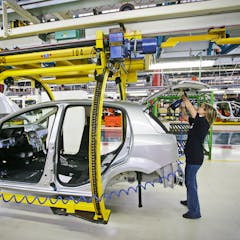
Articles on Toyota
Displaying 1 - 20 of 38 articles

The amended rules will slow the reduction in emissions from Australia’s polluting road transport sector and reflect alarming trends, here and abroad.

Despite intermittent efforts over the past three decades, the UAW union has been unable to organize employees of foreign-based automakers in states such as Alabama and Tennessee.

Wooing those workers will be expensive and require a lot of creativity, since many of them are employed in ‘right-to-work’ states.

Our interviews with ex-automotive workers reveal how economic change interrupts lives, casting people into new worlds of precarious work and long, indefinite journeys in search of security.

Elon Musk’s dedicated EV maker is miles ahead, but Nissan has several advantages over its legacy rivals.

Ford’s electric F-150 pickup won’t roll off assembly lines until early 2022, but the company has received thousands of preorders already for a vehicle aimed at the mass market, not eco-buyers.

Ford is assembling ventilators, LVMH is making hand sanitizer, and Chanel is making masks. Here’s why these and dozens of other companies are doing it.

Major brands which suffer from high profile product recalls need to follow some basic rules to make sure they weather the storm.

The motorcycle maker angered Trump after it said it plans to move some production overseas to avoid EU tariffs – just a few months after the president praised the company for being a ‘true American icon.’

Rather than fret about how many jobs future technologies will destroy, we should focus on how to shape them so that they complement the workforce of tomorrow.

Volvo might be the first car company to go all-electric, but it’s far from the market leader and petrol will continue to be relied upon.

The level of corporate fines for anti-competitive conduct in Australia is woefully below international benchmarks.

The behavior of Ford South Africa around the fires that have engulfed its 1.6-litre EcoBoost Kugas model is a classic case of how not to handle a corporate crisis.

Australia can learn from the US where state governments have attracted foreign investment in manufacturing that contributes to local economies.

Auto manufacturing workers will face significant problems in finding new jobs after the closure of the Ford and Holden plants, a new survey has found.

There is enormous potential for long term and genuine change if universities change their approach to dissent – and reinvent themselves as more agile institutions.

From Ford’s Pinto problem to Takata’s defective airbags, sometimes it seems auto companies know how to do little more than mismanage product recalls.

If you were to choose one buzzword that, despite its vagueness, has dominated industrial relations debate over three decades, it would be “flexibility”. It has emerged again in rhetoric surrounding Toyota’s…

Unless you have been living under a rock, you couldn’t help but hear the dying wail of manufacturing here in Australia. Car manufacturing and food manufacturing being the most recent victims. There’s no…

Prime Minister Tony Abbott is right when he describes Australia’s car industry workers as “highly skilled people, adaptable people”. He has also been saying this week that the departure of Toyota and Holden…
